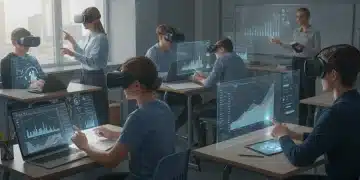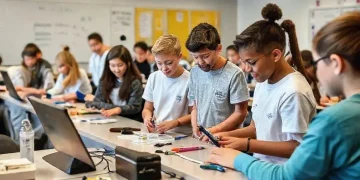Recent patterns in academic success: trends for 2025

The alignment of education with future job market skills, such as critical thinking and digital literacy, is crucial for preparing students to succeed in evolving careers.
Recent patterns in academic success show that our approach to education is evolving rapidly. As we look toward 2025, we need to consider what these changes mean for students, educators, and the job market. Are you ready to discover how these trends might impact your academic journey?
Emerging technologies influencing academic performance
Emerging technologies are reshaping how students learn and perform academically. Innovations make education more engaging and accessible than ever before. With tools like artificial intelligence and virtual reality, learning can be tailored to each student’s unique needs.
Impact of Artificial Intelligence
The use of artificial intelligence in education offers personalized learning experiences. AI can analyze student performance, adapt lessons, and provide feedback instantly. This means that students can work at their own pace, mastering content before moving on to new concepts.
Benefits of Online Learning Platforms
Online learning platforms have transformed academic access. They offer resources to students from various backgrounds, ensuring everyone has an equal opportunity to succeed. With features like video lectures, interactive quizzes, and discussion forums, these platforms encourage collaboration.
- Accessibility of materials anytime
- Peer support through discussion forums
- Flexibility in learning schedules
By embracing new technologies, educators empower students to take charge of their education. For instance, gamified learning experiences create excitement and motivation to achieve. These innovations foster a love for learning that can last a lifetime.
The Role of Virtual Reality
Virtual reality is another exciting technology impacting academic performance. It allows students to immerse themselves in realistic scenarios. For example, history students can experience events from the past firsthand, making lessons more memorable.
This hands-on approach improves retention and understanding. By engaging multiple senses, VR technology helps students grasp complex subjects. As these technologies continue to evolve, their potential to enhance learning becomes even more pronounced.
Collaboration Tools in Education
Collaboration tools, like shared documents and group project apps, facilitate teamwork among students. These technologies promote communication and organization, which are essential skills in today’s workforce. Additionally, they prepare students for real-world challenges they will face after graduation.
- Improved communication among peers
- Organization of group assignments
- Development of teamwork skills
Overall, emerging technologies play a vital role in improving academic performance. As they become increasingly integrated into educational practices, students will benefit from a more engaging and effective learning environment.
Each innovation brings its own advantages, making education more inclusive and inspiring for everyone involved.
Top learning strategies for students in 2025
As students prepare for 2025, they need to adopt the top learning strategies that can enhance their academic success. Understanding how to learn effectively is just as important as what they learn.
Active Learning Techniques
One key strategy is implementing active learning techniques. This approach encourages students to participate actively in their learning process. When students engage with the material, it becomes easier to understand and retain information.
- Participating in discussions
- Working on projects in groups
- Teaching others what they have learned
By using these methods, students not only learn more but also develop essential skills like critical thinking and collaboration. These abilities are crucial for their future careers in a rapidly changing world.
Utilizing Technology Effectively
In 2025, technology will play a significant role in education. Students should learn how to use various digital tools effectively. For example, they can access online resources, educational apps, and virtual simulations to enrich their understanding of complex concepts.
In addition, digital note-taking apps can help organize thoughts and keep track of assignments. These tools provide flexible learning environments, allowing students to study anytime, anywhere.
Setting SMART Goals
Another effective strategy is setting SMART goals. SMART stands for Specific, Measurable, Achievable, Relevant, and Time-bound. By using this framework, students can create clear objectives for their studies.
- Specific: Define what they want to achieve.
- Measurable: Track their progress.
- Achievable: Set realistic expectations.
- Relevant: Ensure goals align with their overall ambitions.
- Time-bound: Set deadlines for achievement.
When students set and follow through on SMART goals, they can stay motivated and focused throughout their academic journeys. Each accomplishment helps build confidence and encourages further growth.
Lastly, fostering a growth mindset is essential. Students who embrace challenges and view failures as learning opportunities are more likely to persevere. Cultivating resilience allows them to adapt to new situations and tackle obstacles with determination.
Impact of mental health on academic success

Mental health plays a crucial role in academic success. Students who face mental health challenges often struggle with focus, motivation, and overall performance. Understanding this impact is essential for creating supportive learning environments.
Connection Between Mental Health and Learning
Research shows that there is a strong connection between mental health and learning abilities. When students feel anxious or depressed, it can be hard for them to absorb new information. They may have difficulty concentrating during lessons, which leads to poorer performance on tests and assignments.
- Increased anxiety can lead to avoidance of schoolwork.
- Depression may result in decreased energy and interest in attending classes.
- Stress can affect memory retention and recall abilities.
Addressing these mental health issues can open the door to improved academic performance. Schools are beginning to recognize the importance of mental health support as part of their educational strategies. Many are implementing programs that focus on wellness and mindfulness.
Strategies for Supporting Mental Health
Providing resources and support for students is essential. Here are some effective strategies to promote better mental health:
- Access to counseling services for students in need.
- Workshops on managing stress and anxiety.
- Opportunities for physical activity, which can improve mood.
Encouraging students to practice mindfulness can also enhance their focus and emotional resilience. Simple techniques like deep breathing and meditation can help students calm their minds and reduce stress before exams or important assignments.
Moreover, fostering a supportive school culture where students feel safe to express their feelings can make a significant difference. Peer support programs can encourage students to look out for one another, creating a sense of community.
Finally, parents and educators must work together to recognize signs of mental health struggles early. Open communication about feelings can help students feel understood and supported, which is vital for their overall success. By putting mental health at the forefront, we can help students thrive academically and personally.
The role of diversity in educational achievement
Diversity plays a vital role in educational achievement. A rich mix of backgrounds, cultures, and perspectives can enhance learning experiences for all students. When classrooms foster diversity, they become more inclusive, helping everyone to reach their full potential.
Benefits of Diverse Learning Environments
When students learn together in a diverse setting, they expose each other to new ideas and viewpoints. This exposure leads to greater understanding and empathy. Research shows that diverse teams often perform better when solving problems, a skill that is essential in today’s global society.
- Improved critical thinking skills.
- Greater collaboration and teamwork.
- Enhanced creativity from different perspectives.
Moreover, students from diverse backgrounds may relate to different teaching methods. This flexibility can help educators reach students who might otherwise struggle, ensuring that everyone has the chance to succeed.
Creating Inclusive Classrooms
To maximize the benefits of diversity, educators must create inclusive classrooms. This means recognizing and valuing each student’s unique contributions. Effective teacher training programs can help educators develop strategies to create an inclusive environment.
Inclusion involves actively engaging students in discussions that celebrate multicultural perspectives. It encourages students to share their stories and experiences, enriching the classroom experience for everyone.
- Encouraging open dialogue about differences.
- Implementing diverse curricula that reflect various cultures.
- Creating group projects that allow collaboration among diverse students.
These practices not only benefit students academically but also prepare them for future workplaces filled with diverse colleagues. By learning to appreciate and respect differences, students develop essential social skills that will serve them well throughout their lives.
Finally, promoting diversity within educational settings helps combat stereotypes and prejudices. When students from various backgrounds learn together, they are more likely to challenge misconceptions about others. This fosters a healthier school climate where everyone feels valued.
Future job market skills and academic alignment
Understanding the traits needed for the future job market is essential for students today. Schools must ensure academic programs align with these future job market skills. This alignment helps students prepare for careers that are constantly evolving and require new competencies.
Key Skills for Future Jobs
Emerging job markets often prioritize certain skills over traditional education. Some of the top skills for the future include:
- Critical thinking: The ability to analyze information and make informed decisions is vital.
- Communication: Both verbal and written skills are crucial for teamwork and collaboration.
- Digital literacy: Navigating technology and understanding data will be essential in various industries.
- Adaptability: Being able to adjust to new situations and learn quickly will benefit students.
These skills should be emphasized in coursework, ensuring that students are not only acquainted with academic theories but also practical applications in real-world situations. It’s important for education systems to evolve and integrate these skills into their curricula.
Aligning Education with Career Paths
Schools can align education with career paths by offering programs that focus on both academic knowledge and hands-on experience. For instance, internships and cooperative education programs allow students to gain real-world experience while still in school. This combination of learning enhances their employability after graduation.
Additionally, partnerships with local businesses and organizations can provide students with practical insights into the job market. Such collaborations can expose students to different career options and help them make informed choices regarding their future.
- Networking opportunities with industry professionals.
- Real projects that mirror work expectations.
- Job shadowing experiences to see daily operations.
Moreover, schools should promote lifelong learning by encouraging students to pursue continuous education beyond their formal schooling. This mindset fosters a culture where individuals are always seeking to improve their skills and knowledge, which is critical in today’s fast-paced world.
As we look to the future, the job market will continue to shift. Ensuring that students are equipped with the relevant skills and knowledge will prepare them to thrive in their chosen careers. Schools play an essential role in this preparation, shaping a future workforce that meets the demands of society.
FAQ – Frequently Asked Questions about Future Job Market Skills and Academic Alignment
What are the key skills needed for future jobs?
Important skills include critical thinking, communication, digital literacy, and adaptability, which are essential for success in a rapidly changing workforce.
How can schools help students prepare for the job market?
Schools can integrate real-world experiences through internships, partnerships with local businesses, and curricula that focus on relevant skills.
Why is diversity important in education?
Diversity enhances the learning environment, promotes empathy, and prepares students for a global workforce by exposing them to various perspectives.
What role does lifelong learning play in career success?
Lifelong learning encourages individuals to continuously update their skills, helping them stay relevant and adaptable in their careers.





